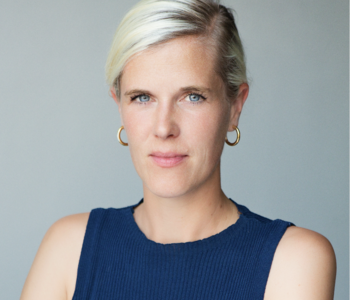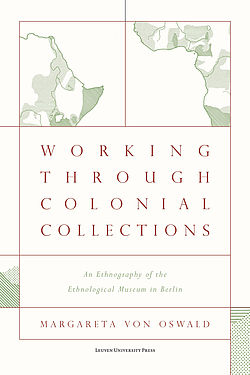Dr. Margareta von Oswald | Assoziierte Forscherin

Mutterinstitut
:
Humboldt-Universität zu Berlin, EHESS
|
Position
:
wissenschaftliche Mitarbeiterin, Humboldt-Universität zu Berlin
|
Fachbereich
:
Anthropologie
|
Biographie
Ich bin Anthropologin, Kuratorin und seit 2024 wissenschaftliche Mitarbeiterin am Centre for Advanced Study inherit.heritage in transformation. Hier bin ich insbesondere zuständig für den Berich "Wissensaustausch". Meine Dissertation schloss ich 2021 in einem Cotutelle-Verfahren zwischen der EHESS/Ecole Normale Supérieure, Paris, und der Humboldt-Universität zu Berlin ab, anschließend an den Master 'Pratiques de l'Interdisciplinarité' an der EHESS und der Ecole Normale Supérieure, und einem Bachelor in Sozialwissenschaften an der Universität Stuttgart und Sciences Po Bordeaux.
Meine Forschung befasst sich mit der Frage, wie Menschen sich in der Gegenwart mit umstrittenen Vergangenheiten, insbesondere der kolonialen, auseinandersetzen, und wie Museen zu demokratischeren Orten werden können. Am Centre Marc Bloch habe ich hier, gemeinsam mit einem internationalen Team an Forscher*innen und Kurator*innen 2022 die Académie des Traces ins Leben gerufen, die sich durch verschiedene Formate with Online-Seminare oder Sommerschulen mit der Frage beschäftigt, wie koloniale Sammlungen zwischen den afrikanischen und europäischen Kontinenten als Vermittler*innen zentraler gesellschaftlicher Gegenwartsfragen agieren können.
Von 2021-2023 arbeitete ich im Projekt Mindscapes. Mindscapes hatte zum Ziel, zu einer Veränderung beizutragen, was wir unter mentaler Gesundheit verstehen, wie wir sie behandeln und wie wir darüber sprechen. Ausgangspunkt des Projekts in Berlin ist die Auseinandersetzung des Mindscapes Artist-in-Residence Künstlers Kader Attia mit dem Thema Reparatur im Gropius Bau, die von September 2022 bis Januar 2023 in der Ausstellung YOYI! Care, Repair, Heal und einem öffentlichen Programm mündete. Ein wichtiges Resultat des Projekts ist die open-access Publikation "Berliner Gespräche über mentale Gesundheit (de) / Berlin conversations on mental health (eng)", die ich gemeinsam mit Diana Mammana herausgegeben habe, und die den Preis der Stiftung Buchkunst für das schönste deutsche Buch 2024 in der Kategorie Fachbuch erhielt.
Von 2016-2021 war ich wissenschaftliche Mitarbeiterin und Doktorandin im Projekt "Making Differences. Transforming Museums and Heritage in the 21st Century". In der Forschungsgruppe "Transforming the Ethnographic" (mit Jonas Tinius und Larissa Förster) beschäftigten wir uns damit, wie das Erbe anthropologischer Wissensproduktion und Sammelns heute verhandelt wird, unter Berücksichtigung von Entwicklungen und Perspektiven aus dem politischen, aktivistischen, wissenschaftlichen, künstlerischen und kuratorischen Bereich. Ein wichtiges Ergebnis der Forschungsgruppe ist der Sammelband 'Across Anthropology. Troubling Museums, Colonial Legacies, and the Curatorial' (2020, Leuven University Press, hrsg. mit Jonas Tinius).
Die Dissertation befasst sich mit den Möglichkeiten und Grenzen der Aufarbeitung des Kolonialismus im Berliner Ethnologischen Museum, insbesondere in dessen Afrika-Abteilung. Basierend auf einer zweijährigen Ethnographie der verschiedenen Arbeitspraktiken des Museums (2013-2015), Interviews mit aktuellen und ehemaligen Mitarbeiter*innen sowie Archivarbeit untersucht die Dissertation die Einbettung in und Verstrickung des Museums mit kolonialen Denkmuster, Epistemologien und Praktiken. Anhand des Begriffs des ‚working through’ (durcharbeiten) wird aufgezeigt, dass das durcharbeiten der kolonialen Präsenz im Museum ein langwieriger und verstörender Prozess ist. Diese Aufarbeitung schließt Prozesse der Anerkennung der koloniale Vergangenheit ein, zeigt aber auch vielfältige Formen von Widerstand, Verleugnung und Verweigerung im Museum auf – und fordert somit dazu auf, die Auseinandersetzung mit der koloniale Vergangenheit als eine fortlaufende und unabgeschlossene Herausforderung zu sehen, die weit über das Museum hinausgehen. Meine erste Monographie Working Through Colonial Collections. An Ethnography of the Ethnological Museum in Berlin (Leuven University Press, 2022) basiert auf meiner Forschung für die Dissertation.
Titel der Dissertation
Working through colonial collections. An ethnography of the Ethnological Museum in Berlin
Zusammenfassung der Dissertation
What are the possibilities and limits of engaging with the ongoing articulations of colonialism in ethnological museums? This book addresses this question from within Berlin’s Ethnological Museum; more particularly, its Africa department. It captures the Museum in a moment of substantial transformation, as it prepared the move of its exhibition to the Humboldt Forum, a newly built and contested cultural centre on Berlin’s museum island. Debates around this move and the eethnolgoical collections have served as central prisms to negotiate Germany’s stance towards its colonial history. The book discusses almost ten years of debate during which German colonialism has been negotiated, and further recognised, via conflicts over its colonial museum collections (2012-2021).
Crystallised in the notion of ‘working through’, the reckoning with enduring colonial presences articulates as inconclusive and unsettling work in the Museum. It includes processes of recognition and acceptance of the colonial past and its duress, as well as multiple forms of difficulties and resistances to do so. ‘Working through colonial collections’ then points to central questions which concern our contemporary societies more generally: the reverberance, echoes, and aftermaths of colonialism in our everyday in its epistemologies, representations, materialities, or even more concretely,the words, relations, and affects we deal with.
This analysis is based on a two-year-ethnography of the museum’s different work practices, oral history interviews with current and former employees as well as archival work. Beyond recent debates on restitution and provenance, this ethnography engages with the diverse areas of expertise in the Ethnological Museum – the conserving, storing, ordering, curating, and researching of collections. The book examines the Museum’s embeddedness in colonial regimes of conceiving and doing the world: It shows how these regimes unfold in the Museum’s everyday – and thereby hopes to serve as a grid of analysis not only for other ethnological museums, but also Western museums more generally.
Institution der Dissertation
Betreuer
Das resonante Museum
Wie sehen Museen ihre eigene Rolle, und wie verändern sie dementsprechend ihre Funktions- und Arbeitsweisen, um gesellschaftsrelevant agieren zu können? Welche Auswirkung hat dies insbesondere auf kuratorische Praxis?
Anhand des Mobilitätsstipendiums PROCOPE der französischen Botschaft werde ich ab Herbst 2023 in Frankreich mit Akteuren der französischen Museums- und Kulturinstitutionslandschaft in den Austausch treten, um die Potentiale von Museumsarbeit zu erkunden.
Awkward Archives
01.März 2023Margareta von Oswald , Jonas Tinius, Bernd Scherer, Lynhan Balatbat-Helbock, Hannes Hacke, Yann LeGall,Franka Schneider, Tahani Nadim
ISBN: 978-3-948212-92-9
Awkward Archives proposes a manual for academic teaching and learning contexts. An ethnographic research approach is confronted with the demands of archival research as both disciplines challenge their inner logics and epistemologies. Through fieldwork and ethnographic tools and methods, both analogue and digital, the editors take various contemporary archival sites in Berlin as case studies to elaborate on controversial concepts in Western thought. Presenting as such a modular curriculum on archives in their awkwardness—with the tensions, discomfort and antagonisms they pose.
With case studies on Haus der Kulturen der Welt, the Hahne-Niehoff Archive and the Museum für Naturkunde Berlin, among others.
Working Through Colonial Collections. An Ethnography of the Ethnological Museum in Berlin
15.Dezember 2022Margareta von Oswald
Edition: Leuven University Press
ISBN: 9789461664259
Reckoning with colonial legacies in Western museum collections
What are the possibilities and limits of engaging with colonialism in ethnological museums? This book addresses this question from within the Africa department of the Ethnological Museum in Berlin. It captures the Museum at a moment of substantial transformation, as it prepared the move of its exhibition to the Humboldt Forum, a newly built and contested cultural centre on Berlin’s Museum Island. The book discusses almost a decade of debate in which German colonialism was negotiated, and further recognised, through conflicts over colonial museum collections.
Based on two years of ethnographic fieldwork examining the Museum’s various work practices, this book highlights the Museum’s embeddedness in colonial logics and shows how these unfold in the Museum’s everyday activity. It addresses the diverse areas of expertise in the Ethnological Museum – the preservation, storage, curation, and research of collections – and also draws on archival research and oral history interviews with current and former employees. Working through Colonial Collections unravels the ongoing and laborious processes of reckoning with colonialism in the Ethnological Museum’s present – processes from which other ethnological museums, as well as Western museums more generally, can learn.
With a preface by Sharon Macdonald.
https://lup.be/collections/category-anthropology/products/152458
Publikationen
Books and special issues
Examining De/Colonial Traces Through Colonial Collections / Examiner les traces dé/coloniales à travers les collections coloniales, 2025
Edited dossier in cooperation between the Académie des Traces and the online platform Contemporary And, with an introduction by Margareta von Oswald, and composed of 7 contributions by members of the Académie des Traces
Traces du dé/colonial au musée
Edited volume, with Felicity Bodenstein, Damiana Otoiu, Anna Seiderer, Paris, Editions Horizons d‘Attente, 2024
The Resonant Museum. Berlin Conversations on Mental Health / Berliner Gespräche über mentale Gesundheit, Open access publication in German and English, edited with Diana Mammana, Cologne, Verlag der Buchhandlung Franz und Walther König, 2024
Working Through Colonial Collections. An Ethnography of the Ethnological Museum in Berlin, Open access monography Leuven University Press, 2022
Awkward Archives. Ethnographic Drafts for a Modular Curriculum, Open access curriculum, edited with Jonas Tinius, Berlin/Milan/Dakar, Archive Books, 2022
Across Anthropology: Troubling Colonial Legacies, Museums, and the Curatorial, Open access edited volume, edited with Jonas Tinius, Leuven University Press, 2020
Engaging Anthropological Legacies, Special issue of Museum Worlds, edited with Henrietta Lidchi and Sharon Macdonald, 2018
